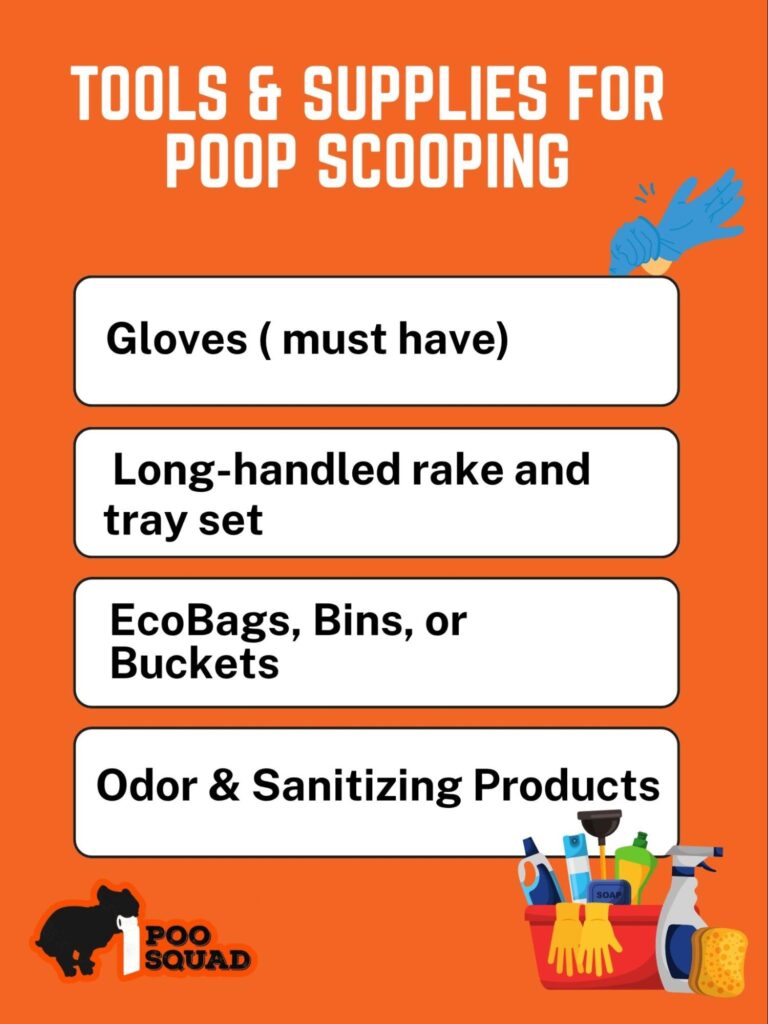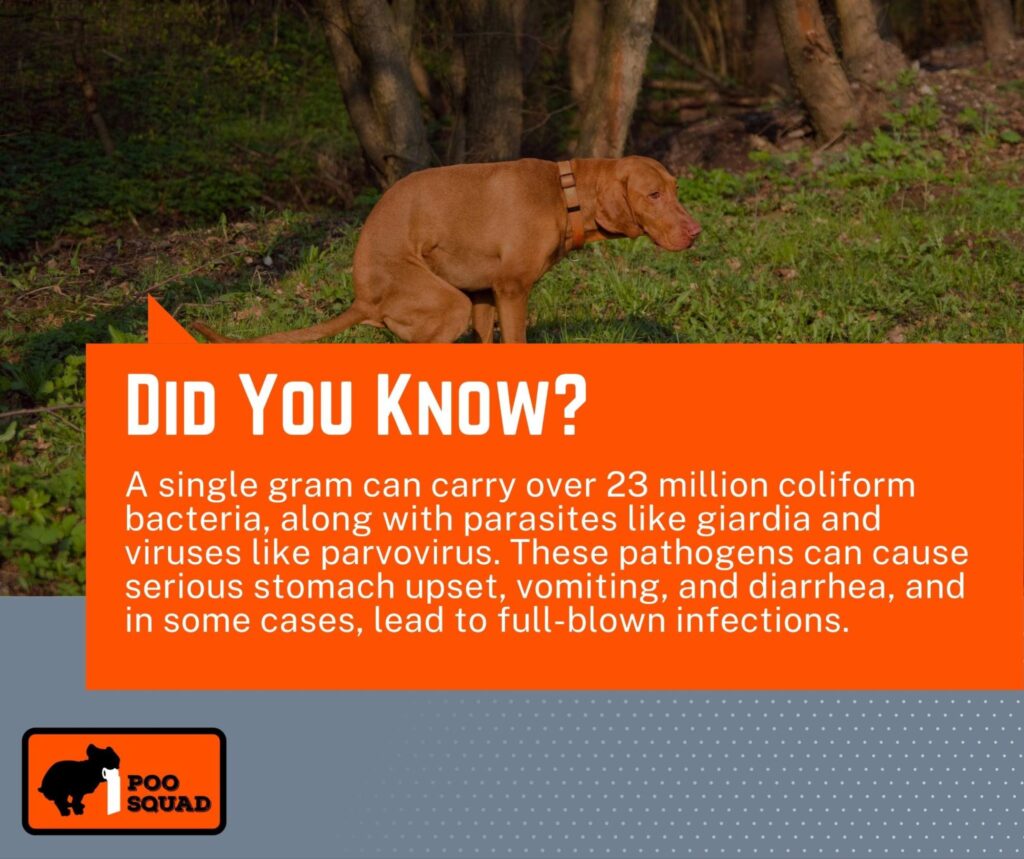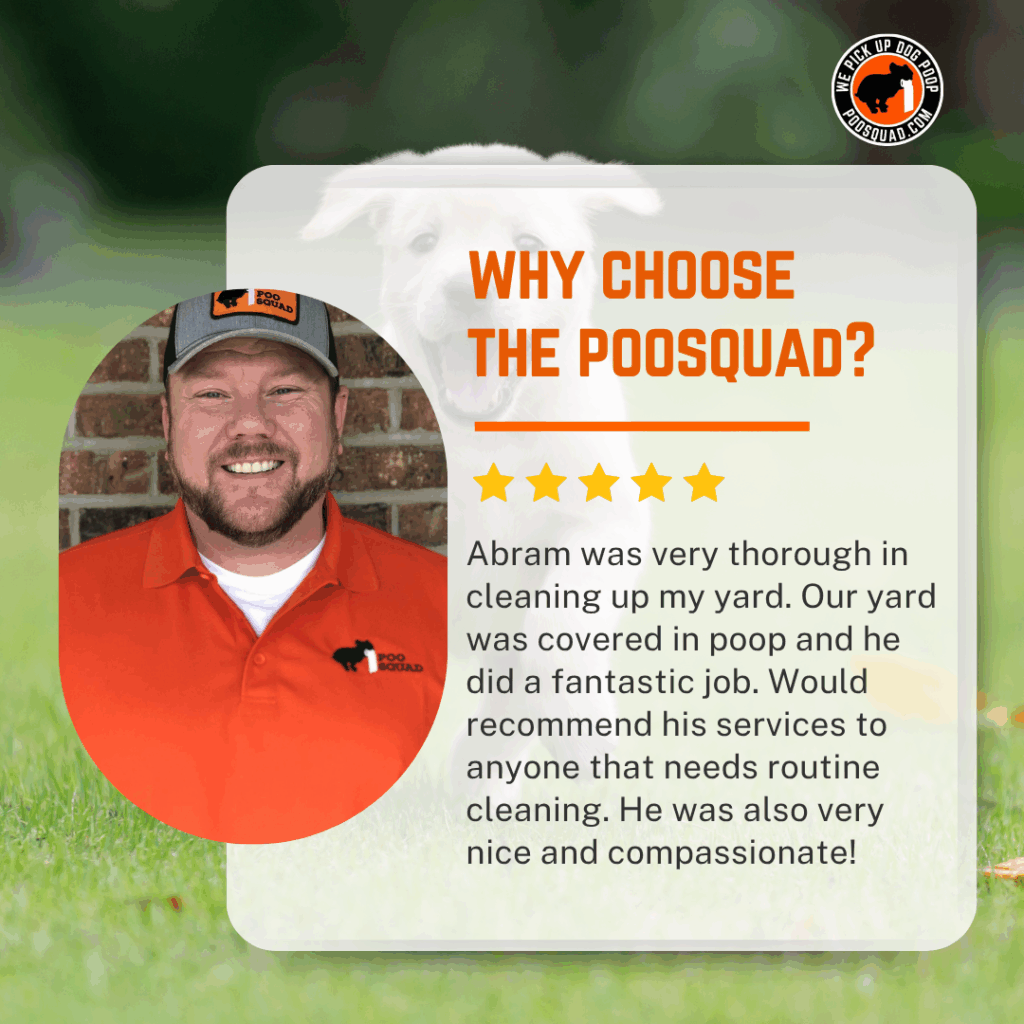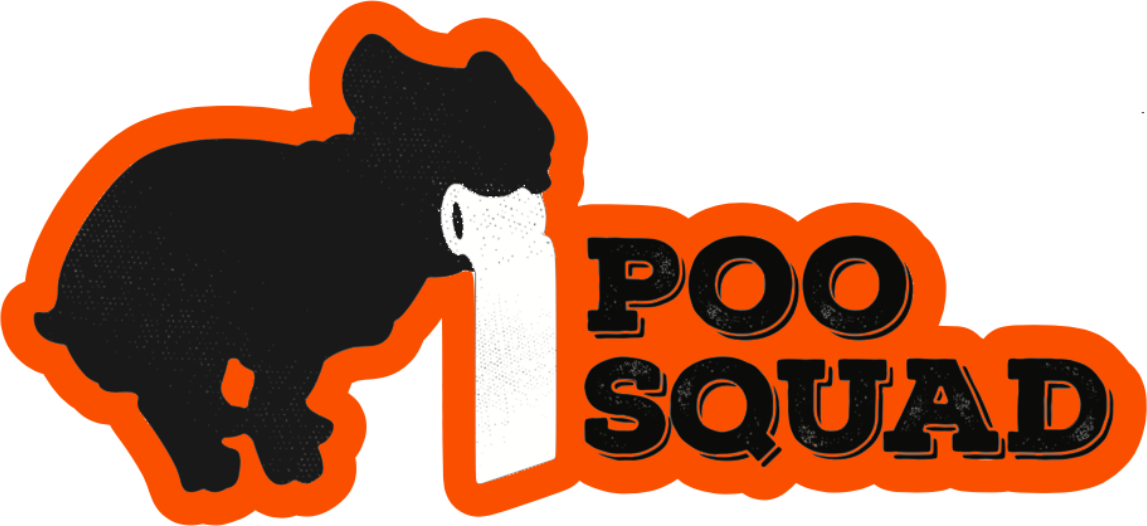Dog poop left in the yard can damage your lawn, spread bacteria, and attract pests. To keep your outdoor space clean and safe, you’ll need more than a quick scoop. You’ll need a routine that removes waste and neutralizes odor at the source.
From harmful bacteria like E. coli to nitrogen burn on your grass, pet waste affects more than just your shoes. If you’re dealing with lingering odor, a backyard “minefield,” or bacteria tracked indoors, this guide is for you.
Here’s the step-by-step we recommend:
- Dog waste isn’t harmless – It spreads bacteria, attracts flies, and kills grass if left too long
- Scoop, rinse, sanitize, deodorize – That’s the full routine to remove both mess and smell
- Use the right tools – Durable scoopers, sealed bins, and enzyme cleaners make cleanup easier
- Stop bacteria spread – Sanitation keeps waste from contaminating shoes, paws, or outdoor gear
- DIY or delegate – You’ll learn when to clean it yourself, and when it’s time to call in pros
This guide breaks it all down: cleanup tools that last, odor removal that works, and smart strategies for pet parents who don’t want to spend weekends dodging landmines. Whether it’s one pup or five, we’ve got real solutions for real-life yards.
Let’s dig in, your grass, your shoes, and your weekend peace of mind will thank you.
Tools & Supplies for Poop Scooping
Before you can master the cleanup game, you’ve got to stock your yard war chest. Not all scoopers, bags, or sprays are created equal; some just smear the mess around or fall apart when it matters most.
Whether you’re dealing with one dainty doodle or three big mutts on a protein binge, the right gear saves time, keeps your yard cleaner, and makes the job way less gross.
Best Pooper Scoopers & Rakes for the Job
For most yards, a long-handled rake and tray set is the gold standard. You don’t have to bend down, you can cover more ground, and they hold up over time. Look for models with steel handles and non-stick trays that won’t gum up after one pass.
If you prefer to bag it as you go, handheld scooper bag tools offer a quick grab-and-go option, but be warned, they’re not great for large yards or thick grass.
Now, for those dealing with snow-packed yards or frozen waste, you’ll want tools that won’t shatter on impact. Flat-edge metal scoopers with a chisel-style rake are the go-to here; they get under frozen waste without splintering like the plastic ones tend to do.
Tall grass or artificial turf brings its own set of problems. Flexible rubber rakes with angled teeth do a better job reaching into the blades without dragging turf infill all over the place.

Choosing the Right Bags, Bins, or Buckets
Once you’ve scooped, the question becomes: where does it all go?
Biodegradable poop bags break down faster and don’t choke up landfills like traditional plastic. Just make sure they’re truly certified; many “eco” bags still take years to degrade.
If you’re dealing with multiple dogs or you’ve let the yard go for a while (it happens), bucket-style bins with sealable lids are your best friend. They reduce odors, store waste between trash days, and make it easy to keep the area tidy until pickup.
Wondering if that first cleanup after weeks of buildup is going to cost more?
If it’s a one-time deep-clean and the yard looks like a war zone, yes, some services adjust their rates based on volume and labor. But once it’s clean, ongoing maintenance is much smoother (and cheaper).
Must-Have Odor & Sanitizing Products
Poop is only part of the problem, odor and bacteria are the silent tagalongs. That earthy funk hanging around your patio or dog run? That’s bacteria at work.
Enzyme-based cleaners break down organic waste at the source and work better than standard household sprays. They’re safe for pets and yards, and they neutralize smells instead of just masking them.
Artificial turf and patio areas need special love. A quick rinse won’t cut it. Regular enzyme treatments help control bacteria growth under the surface, especially if you have male dogs that mark territory like it’s their job.
If you want a clean-smelling yard without lifting a finger, there’s always the deodorizer treatment option built into some cleanup services.
Poop Pickup Techniques & Yard Cleaning Strategy
Scooping a yard isn’t about blind wandering with a bag. A little strategy saves time, keeps your shoes cleaner, and helps make sure nothing gets missed (especially the gross ones hiding in tall grass or mulch).
Where to Start: Mapping Out Your Yard
Start from one corner and work your way across in a grid or sectioned layout. Walk in straight lines or overlap your path like you’re mowing. This way, you’ll avoid double-backing and catch the sneaky ones your dog hid behind the grill or under the trampoline.
Potty-trained pups tend to go in the same zones, mark them mentally or even with garden stakes, so you can check the hotspots first. Free-range barkers? You’ll need to cover more ground, especially if they treat the entire backyard like one big bathroom.
How Weather Impacts Poop Cleanup
Rain turns your yard into a poop blender. It breaks apart the surface of waste and spreads bacteria through runoff. Worse, it softens things just enough to smear into the grass or your shoes if you’re not careful.
During storms, skip the hose temptation. Hosing it down just moves the mess, not to mention, it sends waste into storm drains, where it contributes to water pollution. If cleanup can’t wait, use scoopers with a wide base or buckets with lids to minimize spreading.
Snow and freezing temperatures pose their challenges. Waste gets buried, freezes into clumps, or becomes one with the turf. That’s where tools with strong edges and a little patience come into play.
Handling Special Scenarios
Big dogs mean big loads. Add a couple to the mix, and things escalate fast. For multi-dog homes, cleanup frequency becomes key; aim for every other day if not daily. Letting it pile up not only ruins the grass but creates a landmine field no one wants to walk through.
Trying to manage that on your own gets old fast. That’s why many folks lean on cleanup crews who know how to handle volume and can find what’s hiding under the snow, leaves, or tall weeds.
Then there’s what we call the “special deliveries”, those soft, swirling messes from the pudding pups, or the rainbow-colored art projects from dogs who eat crayons, socks, or who-knows-what. If you’re seeing weird colors or diarrhea consistently, it might be time to chat with a vet. And in the meantime, use flat-bottom scoopers or disposable bags to isolate the mess without smearing it deeper into the yard.
Sanitation & Safety Tips Every Dog Owner Should Know
Dog poop isn’t just gross, it’s a walking health hazard. What most people think of as an annoying chore is one of the easiest ways to protect your home, pets, and family from a long list of microscopic nightmares.
Why Dog Poop Is Dangerous

Each little pile might look harmless, but it’s loaded with bacteria like E. coli, Salmonella, and roundworms. Just one gram can hold millions of pathogens. Let it sit too long, and that bacteria seeps into the grass, shoes, paws, and eventually, your house.
There’s a common myth floating around that dog poop works like fertilizer. It doesn’t. Unlike manure from plant-eaters, dog waste is acidic and protein-rich; it kills grass, burns plants, and poisons garden soil. Instead of growing anything, it leaves behind brown spots and toxic residue.
Cleaning Tools Between Yards
If you’re cleaning up one yard and then hitting another (or even using the same tools after a few days), you could be spreading viruses without realizing it. Parvovirus is a prime example; it can survive on surfaces for months and travels easily via dirty rakes, boots, or even your gloves.
That’s why tool and shoe sanitation after every yard matters. It’s not just about being tidy, it’s about keeping other dogs (and your own) safe. Using disinfectants between yards is a practice that sets pro cleanup crews apart. It also explains why some companies charge a bit more; they’re doing more behind the scenes to protect everyone involved.
Pet & Family Safety Considerations
If you’ve got kids playing in the yard, poop exposure can go unnoticed until it ends up on their hands, shoes, or toys. Even fenced-in yards can become health risks if cleanup slips for a few weeks. And when dogs step in it, they track bacteria inside, where it ends up on your floors and furniture.
To avoid this, it’s smart to establish a designated “poop zone” in the yard, or better yet, just keep the whole thing clean consistently. For families with young children or dogs who love to roll in anything they find, regular sanitation can make the difference between a safe yard and a petri dish.
If you want someone else to handle that layer of safety, the crews who sanitize tools and even shoes between yards are worth a look.
What to Do With All That Poop: Disposal Options
Once it’s scooped, the question becomes, now what? Whether you’re doing daily cleanups or just tackled a small poop apocalypse, handling waste the right way makes a difference in smell, safety, and how your yard holds up over time.
Trash vs. Compost vs. Digesters
The easiest route is bagging it and tossing it into the trash. But make sure you know your local rules; some municipalities have restrictions on pet waste, especially if it’s not bagged properly. Always use tightly sealed bags (ideally biodegradable) to contain odor and bacteria.
For the eco-minded, composting is an option, but it’s not your average backyard setup. Dog waste compost needs a dedicated bin far from food gardens, and it must reach high internal temperatures to kill pathogens. Done wrong, it just creates a hot pile of risk.
Another option is a dog waste digester, which works like a mini septic tank. You dig a hole, drop in the waste, add enzymes and water, and it breaks down over time. These work well in suburban yards with decent drainage and minimal freezing temperatures.
What NOT to Do
Let’s start with the classic mistake, mowing over it. That just shreds the waste, sprays bacteria into the air, and grinds it deeper into your grass. It’s hard on your mower, hard on your lawn, and nobody enjoys the smell cloud that follows.
Another common shortcut is hosing it down. Doesn’t work. That just moves the mess around and sends harmful bacteria straight into storm drains. It also leaves a residue that can soak into soil or hard surfaces and stink for days.
Flushing is another no-go unless you’re using certified flushable bags. Most waste bags, even the ones that say “compostable,” will clog pipes and damage plumbing.
When you’re ready to never think about it again, that’s when a poop pickup service with responsible disposal practices starts sounding pretty good.
When to Hire a Professional Pooper Scooper Service

Let’s face it, there comes a time when you just don’t want to deal with the yard anymore. Whether it’s a jam-packed schedule, bad weather, a bad back, or just sheer overwhelm, handing off poop duty can be one of the smartest decisions you make for your home (and your sanity).
Signs You Need Help
Most folks don’t realize they’re behind until it’s too late. You step outside and think, “How did it get this bad?” The guilt piles up just as fast as the poop. One customer once broke down in tears just seeing a clean yard again for the first time in weeks, because until that moment, they hadn’t realized how much it had been weighing on them.
Busy families, people with mobility challenges, or anyone going through a rough patch often feel embarrassed about asking for help. But there’s zero shame in it. If anything, it shows you care about your pets, your yard, and your peace of mind.
And yes, cleanup services will come inside the fence even if you’re not home. That’s where those little details matter, like verified IDs, bright uniforms, and documented service checklists.
What This Kind of Service Delivers
What separates a quick cleanup from a full-service experience? It’s not just scooping, it’s the confidence that nothing’s left behind (including open gates or cross-contaminated tools).
- You get morning and 10-minute heads-up text alerts so you’re never surprised.
- After every visit, they send a triple gate-check photo, latched and locked.
- If anything looks off with your dog’s poop, a report card flags potential health issues.
- Tools and shoes are sanitized between every yard.
- They never use your bins, hoses, or gear; everything comes in clean and leaves cleaner.
- Lost pets have a better shot at coming home thanks to free QR-coded pet ID tags tied to an online pet profile.
All of that adds up to one thing: relief. You don’t have to worry about the mess, the smell, or what your neighbors think. Just a clean yard, every time.
Pricing & Service Frequency
Most services offer weekly or biweekly options, with pricing based on yard size, number of dogs, and how long it’s been since the last cleanup. The first visit might cost a bit more if it’s been a while, but after that, things usually settle into a flat, manageable rate.
Some offer bucket services where you collect the waste, and they just come to remove it. Others include deodorizer treatments as part of your weekly visit, especially if you’ve got artificial turf or smaller yards prone to lingering smells.
Eco-Friendly & Disability-Friendly Options
Not every cleanup has to leave a heavy footprint on your yard, your wallet, or your energy. There are ways to keep your yard fresh that work better for the planet and better for people with limited mobility, too.
Green Cleaning Tools & Composting Gear
If you’re scooping your yard, switching to biodegradable poop bags and pet-safe enzyme cleaners is a small change with a big impact. These products break down faster and don’t leave behind chemical residue that can harm your grass or pets.
For those going the DIY route long-term, composting systems or digesters made for dog waste can be a great add-on, just be sure to use setups that isolate pet waste from any food-growing soil.
Senior & Disability Support
Mobility issues make cleanup especially challenging. Even light bending or uneven surfaces can turn a routine scoop into a risky task. That’s where professional services shine. You can schedule recurring visits without needing to meet anyone at the gate, and the yard gets handled with zero disruption.
For folks on a fixed income or with specific access needs, it’s worth asking about budget-friendly options or shared routes. Some teams offer flexible pricing based on frequency or need, especially in areas where neighbors coordinate for regular visits.
Sharing Services With Neighbors
Live in a duplex or a tight-knit neighborhood? You might be able to split a service route with someone next door. This works best when you and a neighbor agree on cleanup days and yard access. Not only does it lower the cost, but it also cuts down on scheduling hassles and travel time.
If your neighbor has dogs too, or you both just want to stay on top of things, it’s an easy win for everyone involved.
Emotional Side of Poop Cleanup (Let’s Be Honest)
Nobody talks about it, but nearly everyone has been there, looking out at the yard and feeling that quiet wave of dread. You meant to get to it last weekend… then life happened. Again.
Common Worries & Embarrassments
The truth? It’s not just about poop. It’s about that nagging voice in your head asking, What if someone sees my yard like this?
Or worse, what if the person you hired walks in and silently judges you for the mess?
And then there’s the family drama. In a lot of homes, the dog poop battle becomes a low-key source of tension. One person always ends up doing it. The other forgets. And before you know it, you’re arguing over turds in the backyard like it’s a household crisis.
It’s such a common problem, some teams have even heard, “You saved our marriage.” That’s not an exaggeration.
It Happens to Everyone
Let’s call it like it is, you’re not lazy. You’re not irresponsible. You’re just doing your best with the time, energy, and bandwidth you’ve got. Life is messy. The yard doesn’t have to be.
Hiring help doesn’t mean you’ve failed at being a pet owner. If anything, it means you care enough to get it handled the right way. If you outsource lawn care, house cleaning, or grocery delivery, this is no different.
And when the job is done right, it doesn’t just make the yard better. It gives you one less thing to carry.
Final Checklist: Dog Poop Yard Cleanup Done Right
Before you head out with rake in hand (or give someone else the honor), here’s a quick recap of what makes a clean, safe yard routine stick:
- Use tools that match your yard type, long handles for grass, flat edges for turf, and metal scoops for frozen messes
- Stick to a schedule, don’t let it pile up
- Sanitize tools and shoes after each cleanup to stop bacteria from spreading
- Use enzyme sprays for odor control, especially on patios and turf
- Bring in help if it’s too much to manage alone
- Protect the little feet and paws that run through your yard
Ready for a Cleaner Yard?
Whether you’re a do-it-yourself weekend warrior or ready to hand off the stink, poop cleanup doesn’t have to be a never-ending chore. When you want a clean yard without the hassle, there’s a crew that shows up on time, wears bright orange, and never misses a spot.
Schedule your first yard cleanup today, and experience what it feels like to open the back door without a second thought.
